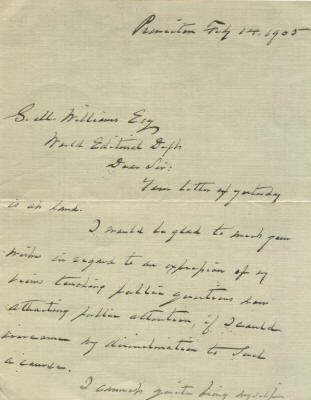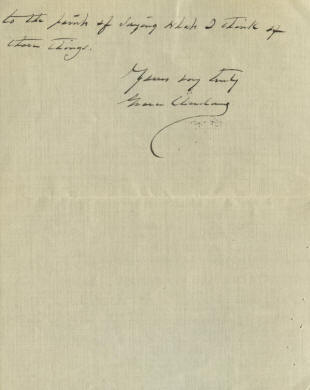604202
Grover Cleveland
Click on image for larger size
“I cannot quite bring myself to the point of saying what I think of these things."
Stephen Grover Cleveland, 1837-1908. Governor of New York, 1883-1884; 22nd President of the United States, 1885-1889; 24th President of the United States, 1893-1897. Autograph Letter Signed, Grover Cleveland, two pages (recto and verso), with integral leaf attached, 5¼" x 6½", Princeton [New Jersey], February 14, 1905.
This letter suggests that the Democrat Cleveland was disgusted by Republican action that he viewed as hypocritical. He apparently holds his tongue on the controversy that contributed to his defeat for reelection in 1888—the federal government's return of Confederate battle flags to the southern states, which Cleveland started to do, and which Republican Theodore Roosevelt had now decided to do himself.
In this letter, Cleveland declines Joseph Pulitzer's New York World's request for a statement. He writes: “I would be glad to meet your wishes in regard to an expression of my views touching public questions now attracting public attention, if I could overcome my disinclination to such a course. / I cannot quite bring myself to the point of saying what I think of these things."
In 1887, Cleveland, a Democrat and only the second post-Civil War president who had not served in the Union army, assented to the Army Adjutant General's suggestion, conveyed to the President by the Secretary of War, that the federal government return to the former Confederate states the battle flags that the Union had captured from Confederate forces. At least 500 captured flags had been deposited with the War Department, where they were identified and cataloged in 1868. They were displayed in the Washington Ordnance Museum from 1874 to 1882 and then stored. Repeated requests for their return were rejected. So when the Adjutant General and Secretary of War suggested this seemingly “graceful gesture,” Cleveland agreed.
But the act touched off a political firestorm, particularly with members of the Grand Army of the Republic, the Union veterans' organization.
The GAR, the strongest political lobby organization in the country with some 400,000 members at the time, was solidly Republican. Its members already disliked Cleveland because he had appointed two southerners to his cabinet, had removed Republicans who were Union veterans and appointed Democrats who were Confederate veterans, and had vetoed hundreds of private military pension bills favoring those whose claims had been rejected by the Pension Bureau. The battle flag controversy gave it a reason to criticize Cleveland even more. The GAR Commander in Chief, General Lucius Fairchild, shouted to a gathering of veterans, ”May God palsy the brain that conceived it, and may God palsy the tongue that dictated it!” Cleveland rescinded his executive order to return the flags, but the damage was done. Although he had earlier accepted an invitation to visit the GAR at its annual Grand Encampment at St. Louis, Cleveland decided not to appear after the GAR warned that he would be subject to verbal abuse and possibly physical assault, and he chastised those who would insult the occupant of ”the people’s highest office.” At a GAR reunion in Wheeling, West Virginia, there was a near riot when some units refused to parade under a banner with Cleveland’s portrait.
The next year, Cleveland lost the presidency to Benjamin Harrison, a former Union brevet brigadier general. Cleveland actually won the popular vote by 100,000 votes but lost the electoral vote 233 to 168. In part because of the battle flag controversy, the veterans' vote went heavily against Cleveland.
In February 1905, when Cleveland wrote this letter, the battle flag issue was again before the public. President Theodore Roosevelt, a Republican fresh off a landslide victory in 1904, working in consultation with Congress, sought to return the flags. Two weeks after Cleveland wrote this letter, Roosevelt sent Congress a bill to do so. Congress unanimously approved it.
This letter is in fine condition. There are minor edge splits at the folds, and there are small pinholes near the vertical fold, but they do not affect the text. Cleveland's handwriting and signature are bold.
Unframed.
_____________
This item has been sold, but
click here to see other
Presidents and First Ladies items
that we are offering.
|





